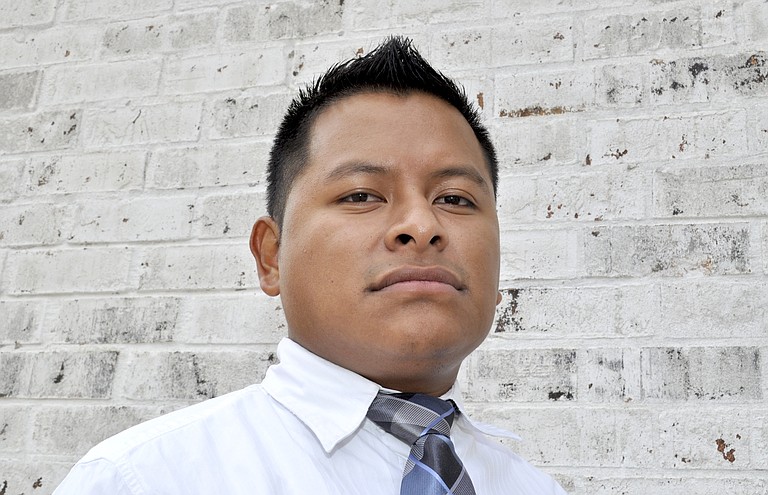Israel Martinez, a Jackson-area businessman who is an undocumented immigrant from Mexico, testified that the high out-of-state-tuition costs have kept him from attending college. Photo by Trip Burns.
Tuesday, March 18, 2014
The cost of enrolling full time at Mississippi Gulf Coast Community College for an in-state resident is $1,150 per semester. Adrian Gamboa, a 20-year-old Biloxi native, pays almost twice that amount, $2,075, to take 12 hours' worth of courses at the Jefferson Davis campus in Gulfport.
That's because Gamboa is an undocumented immigrant. And, even though he lives in Mississippi and attends the same college as some of his high-school classmates, Gamboa must pay the out-of-state tuition rate.
Immigrant-rights advocates have been working to change the law to make college more affordable for Mississippi's growing immigrant population. One proposal, House Bill 209—which Rep. Reecy Dixon, D-Macon, sponsored—failed to make it out of the House Education Committee this session. Rep. Greg Holloway, D-Halzelhurst, who sits on the committee, held a hearing at the capitol Monday afternoon to discuss the issue.
Israel Martinez, a Jackson-area businessman who is an undocumented immigrant from Mexico, testified that the high out-of-state-tuition costs have kept him from attending college.
"These children, all they want is an opportunity to be treated equally," Martinez testified.
Information from the National Immigration Law Center shows that 16 states, many of which have large immigrant communities, already allow undocumented students to pay the same in-state fees as their peers at higher learning institutions.
Experts in the states that have already passed this legislation say the cost of implementation has been negligible. In-state tuition is not the same as free tuition. It is a discount, but in fact the money these students pay actually tends to increase school revenues because it represents income that would not otherwise be there.
The bottom line is that our economic future depends on educating these young people. NILC representatives argue that in states where colleges have evened the playing field for immigrant students, the cost to taxpayers has been "negligible."
Dr. Debra West, representing the Mississippi Community College Board, said the board had no official position on the legislation and wanted to make college affordable for all students.
Rep. Holloway told the Jackson Free Press that questions about how much changing the rules would cost taxpayers needed to be addressed. He said he could propose commissioning a study panel to review the issue and make recommendations for a future session.


Comments
dwall51862 10 years, 1 month ago
After recently working in a small satellite clinic of a large hospital in Jackson, I became aware that many immigrants receive Medicaid. To say I was quite surprised at this was, well, let's just say, an understatement. I have no idea if these individuals were documented, undocumented, etc. They were getting FREE health care which is something a vast majority of hard-working U.S. citizens are not afforded although, in many cases, desperately need. So, there are some "undocumented immigrants" who feel that the out-of-state tuition they are charged to attend institutions of higher learning in the state in which they were raised is too high and unfair. After, granted, a limited amount of research on the subject, it seems the parents of these children came to this country illegally and had these children ("anchor babies") in the U.S. Am I right so far? Now, these children, whose parents may still be undocumented or, perhaps, have been working here under green card status, etc., feel it is unfair they should be charged out-of-state tuition to go to school in the state they have lived in and have attended school in all of their lives? Had their parents going through the U.S. naturalization process when they came to the U.S. have made all of this a moot point? My son went to a community college while working a 50+ hour per week job, studied until long after I went to bed at midnight and achieved a 4.0 grade point average. We were elated when he achieved a score of 32 on his ACT test. His plans were to transfer to MS State and enter their engineering program. After applying and being accepted to MS State, he was devastated to find that academic achievement scholarships are only awarded to entering Freshmen with high academic achievement and not to transfer students with the same achievements. I am not aware of any of our state legislators burning the midnight oil writing bills they hope the MS State Legislature will pass regarding anything as unfair as my son's situation. Welcome to the United States of America! Life is tough all over, even in the land of the free and the home of the brave! So please shut up and stop whining about how unfair you feel this issue is. You are living in the United States of America, documented or not, so be proud of that. Can undocumented immigrants vote? If so, then may I suggest, when you turn 18, if you are not already, if you find this law unfair, offensive or politically incorrect, by all means, get to those polls on voting day!
lgjhere 10 years, 1 month ago
Being an international student isn’t easy, given our complex culture and language. Assistance must come from various sources, including tuition and health care breaks. A new award-winning worldwide book/ebook to help anyone coming to the US is "What Foreigners Need To Know About America From A To Z: How to Understand Crazy American Culture, People, Government, Business, Language and More.” It paints a revealing picture of America for those who will benefit from a better understanding, including international students. Endorsed worldwide by ambassadors, educators, and editors, it also identifies “foreigners” who became successful in the US and how they contributed to our society, including students.
A chapter on education identifies schools that are free and explains how to be accepted to an American university and cope with a new culture, friendship process and classroom differences they will encounter. Some stay after graduation. It has chapters that explain how US businesses operate and how to get a job (which differs from most countries), a must for those who want to work for an American firm here or overseas. It also has chapters that identify the most common English grammar and speech problems foreigners have and tips for easily overcoming them, the number one stumbling block they say they have to succeeding here. Most struggle in their efforts and need guidance from schools’ international departments, immigration protection, host families, concerned neighbors and fellow students, and books like this to extend a cultural helping hand so we all have a win-win situation. Good luck to all wherever you study!
Sign in to comment
Or login with:
OpenID